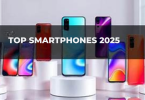Smartphones have come a long way since the early 2000s. From simple calling devices, they’ve turned into powerful mini-computers that help us connect, work, play, and learn on the go. But have you ever wondered what comes next?
Let’s explore the future of smartphones in detail—what we can expect in the next 5 to 10 years, and how those changes will impact our everyday lives.
1. AI Integration: Your Smartphone as a Personal Assistant

Artificial Intelligence (AI) is already helping smartphones offer features like voice recognition, photo editing, and chatbots. But the future holds even more powerful AI.
✨ What’s Coming:
- On-device AI models: AI will run directly on your phone without needing the internet. This means faster performance and better privacy.
- Personalized assistance: Your phone will learn your habits—like when you usually order food or sleep—and make helpful suggestions.
- Voice assistants 2.0: AI will understand context, not just commands. You can say, “Book me the usual flight,” and it’ll know what you mean.
2. Foldable, Rollable & Flexible Designs
Smartphone design is changing rapidly. From flat slabs, we’ve now moved to foldable phones, and the future might bring rollable and stretchable phones.
🌀 Innovations to Expect:
- Tri-fold and rollable phones: Imagine a phone that rolls out into a tablet or folds into a compact device for your pocket.
- Wearable smartphones: Bendable materials may allow phones to be worn like a watch or bracelet.
3. Sustainable & Eco-Friendly Smartphones
With environmental concerns growing, tech companies are focusing on green smartphones.
🌍 What’s New:
- Recycled materials: Phones made from recycled plastic or aluminum.
- Modular parts: Replace or upgrade parts (like batteries or cameras) without changing the whole phone.
- Longer updates: Some countries are pushing laws requiring phones to get software updates for 5–7 years.
4. Battery Life Revolution
Battery problems are still a headache for many users. But solid-state batteries may be the future.
🔋 Future Battery Features:
- Faster charging: Full charge in less than 20 minutes.
- Longer lifespan: Charge your phone once every two days.
- More eco-friendly: Safer and less toxic materials.
5. Satellite Connectivity & Global Access
The future of smartphones includes satellite communication—which means you’ll be connected anywhere on Earth, even without cellular signals.
🛰 What It Means:
- Send emergency messages from remote areas.
- No need for signal towers to stay in touch.
- Perfect for travelers, hikers, and rural residents.
6. Augmented Reality (AR) and Holographic Displays
Phones may soon be able to project 3D holograms, turning your desk into a virtual screen.
🌐 Imagine This:
- Video calling with a 3D version of the person in front of you.
- Playing games where characters appear on your table.
- AR overlays for maps, shopping, or tutorials.
7. 6G & Ultra-Fast Internet
We’re still using 5G in most places, but 6G technology is already in development.
📡 Expected Features:
- Speeds 100x faster than 5G
- No lag during gaming, streaming, or video calls
- Smart city integration, allowing cars, homes, and phones to connect in real-time
8. Better Privacy & Security
As smartphones get smarter, security becomes more important.
🔐 What’s Improving:
- Biometric sensors: Advanced fingerprint, retina, and even voice recognition.
- AI-powered malware detection: Stops cyber threats before they harm you.
- Decentralized data: Your information stays on your phone, not in the cloud.
✅ Benefits of the Future of Smartphones

| Benefit | Description |
| Smarter AI | Personalized features that save time and make life easier |
| Eco-friendly | Recycled materials and modular parts help protect the planet |
| Faster connectivity | 6G and satellite support = no more dead zones |
| Improved battery | Longer battery life and shorter charging time |
| Better security | Safer apps and smarter threat detection |
| New designs | Foldable and rollable screens offer better portability and use |
You may also like to read these posts:
https://techloomz.com/wp-admin/post.php?post=188&action=edit
https://techloomz.com/wp-admin/post.php?post=186&action=edit
https://techloomz.com/wp-admin/post.php?post=184&action=edit
https://techloomz.com/wp-admin/post.php?post=182&action=edit
❌ Drawbacks of the Future of Smartphones
| Drawback | Description |
| High price | New tech often costs more when first released |
| Durability concerns | Foldables may be more fragile than standard phones |
| Privacy worries | AI may collect more personal data, even offline |
| Frequent updates | New tech might require more regular software updates |
| Dependency on tech | As phones get smarter, people may become too reliant on them |
🔄 Final Thoughts
The future of smartphones is exciting and full of promise. Imagine a phone that knows your needs, charges in minutes, folds to fit your wrist, and never loses connection—even in the mountains. But with innovation comes challenges—cost, privacy, and tech overload.
Still, one thing’s clear: our phones will become even more essential in how we work, learn, communicate, and experience the world.
📱 FAQs
Q1. Will my current smartphone become outdated soon?
Not immediately. Even though new features like AI, foldable screens, and satellite connectivity are coming, most apps and networks will still support current smartphones for the next few years. However, you may miss out on some advanced features.
Q2. Are foldable and rollable phones durable?
Newer foldable phones are much more durable than the early versions. Brands like Samsung and Motorola have improved hinge design and screen protection. Still, they may not be as tough as traditional phones and need a bit more care.
Q3. What is on-device AI, and how is it different?
On-device AI means the phone processes information locally, without needing to connect to the internet or cloud servers. This makes your phone faster, more private, and useful even when you’re offline.
Q4. Will satellite connectivity replace mobile networks?
No, it will not replace mobile networks but will complement them. Satellite communication will mostly help in emergencies or in areas without signal, like forests, mountains, or remote villages.
Q5. How long will future smartphones last?
Thanks to better hardware and new sustainability laws (especially in Europe), phones will last longer. Some companies will offer up to 7 years of software updates and easier ways to replace or repair parts.





